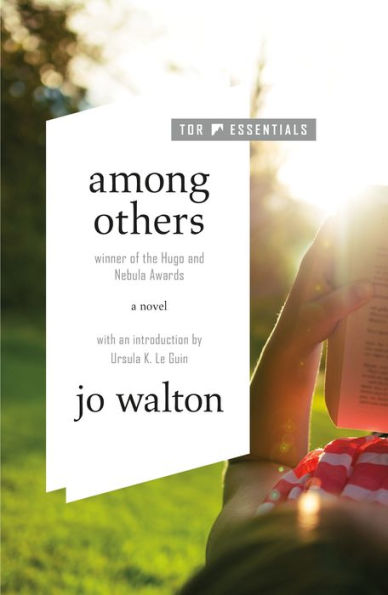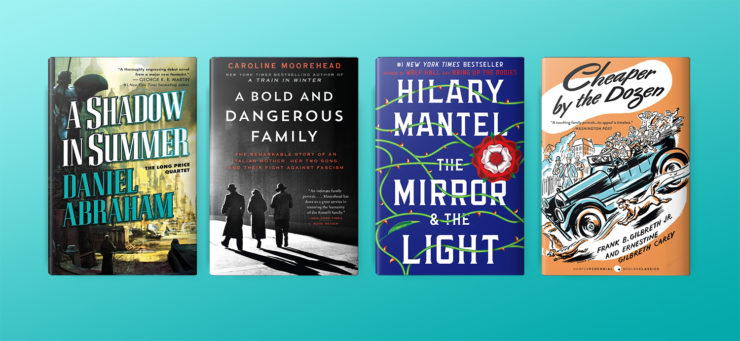Well, March sure was a peculiar month. I was home, and then I was home in self-isolation, which I still am. But I started the New Decameron Project with Maya Chhabra and Lauren Schiller, so I have been snowed under reading stories and writing frame bits, and also setting up online socialising things which are sanity saving (I’m still not an introvert) but take time. Also, some of the things I read this month were extremely long. So I have read only fourteen books in March, and here they are…
Space Viking, H. Beam Piper (1965)
If you want a textbook illustration of the term “fridging,” where a woman is killed to provide a man with motivation, this book is it. There are things I still like about it, and there have always been things I have found problematic about it, but I fear I may have grown out of it. It just wasn’t as much fun as it used to be. Oh well.
A Bold and Dangerous Family, Caroline Moorehead (2017)
This is a brilliant non-fiction book about resistance to Mussolini in Italy, and how hard it was to sustain. It focuses on a wonderful family, who did their best, and who suffered a lot. Fascism in Italy went on so long—ten years before the war started. And we don’t normally hear a lot about it. Interestingly, Mussolini had a system of internal exile, where he sent his political enemies to live on islands. This could have been the worst thing anyone did with their political enemies in the twentieth century—the potential span of evil could have stopped there, sending people to perfectly nice islands with plenty of food and water and houses in the Mediterranean, and not letting them leave. That would have been bad enough. We’d all talk about how awful it was. As it is, well. I recommend this to anyone who is up for it.
The Paston Letters 1422-1509, James Gairdner (1983)
A collection of the letters of the Paston family of England, about everything and nothing, kings, and lands, and marriages, and forgotten nightshirts, and law, and houses. How like and unlike life today.
Buy the Book


Among Others
A Shadow in Summer, Daniel Abraham (2006)
Re-read. First volume of the wonderful Long Price Quartet. These books are so amazing. Such a great world, such great characters, so utterly absorbing. Now this, in a way, has a character who is the opposite of fridged, a woman there to be made use of who becomes proactive where you wouldn’t expect that. There’s also an older woman with a bad leg, one of the major characters. Just read these already.
A Betrayal in Winter, Daniel Abraham (2007)
Re-read. If the first one is good, this one is great. So the thing about these is that you don’t want spoilers, you want to read them without. So I’ll say a structural thing—they’re set fifteen years apart, and cover a whole lifetime, and the gaps between are a real part of the fabric of the story and what he’s doing with a whole world and the people.
An Autumn War, Daniel Abraham (2008)
Re-read. In this book he expands and gives us the point of view of one of the people who has been an “enemy” in the earlier books and that’s amazing. Also, the magic system in these books is so well thought through and just generally excellent.
The Price of Spring, Daniel Abraham (2009)
Re-read. Why aren’t these books always first on people’s lips when they talk about the best books of the first decade of the twentieth century? Genuinely feminist, genuinely thought-provoking. The last social gathering I attended before social gatherings became unwise was a special “trilogy bookclub” meeting where we discussed these books, and everyone had great insights and had loved them and found different things in them. They’re all available as ebooks—if you haven’t read them, give yourself a treat.
Mink Coat, Kathleen Thompson Norris (1943)
Re-read, bath book. You never know what’s going to happen with Kathleen Norris, and sometimes even when you re-read after a long time and you can’t remember, you certainly can’t predict either. She also has no hesitation, none, in overshooting the moment she’s writing in and science-fictionally making up the next bit of history. WWII ends a bit early here, for instance. It’s the story of a woman who gets the chance to ditch her husband, who is away at war, and marry a rich man. She does this and then is very, very sorry. First published as a wartime magazine serial and less coherent for that reason than most of Norris.
A Kiss Before Dying, Ira Levin (1953)
Re-read, bath book. This book is very much in the moment it is set in, the early Fifties, more so than I had remembered. It’s also not a good bath book unless you want to spend a lot of time in the bath, because it’s so riveting and fast paced you don’t want to stop and put it down. It’s about getting away with murder.
Wolf Hall, Hilary Mantel (2010)
Re-read. The final book in the trilogy was coming out, and so I plunged back in at the beginning. This is the fourth time I’ve read this volume: Thomas Cromwell, self-made man, son of a blacksmith, and his rise through the Renaisance court of Henry VIII. This volume is about Thomas More and ends with his death. It’s a straight-up historical novel, no fantasy, but if you like fantasy you will like this. And it’s told in a great close-up present tense third POV; it works really well and I love it.
Bring Up The Bodies, Hilary Mantel (2012)
Re-read, third time I’ve read this volume. This middle volume is about Anne Boleyn and ends with her death. It continues to be great.
The Mirror and the Light, Hilary Mantel (2020)
So maybe it was reading it during a crisis, or maybe it’s me, but while this one is very very good I didn’t like it as much. One of the great achievements of the earlier books is making Thomas Cromwell, who is usually a villain, sympathetic. He’s less sympathetic in this one, greedier and vainer. But it’s still great, and I cried buckets at the end. DO NOT READ THE DRAMATIS PERSONAE—it contains spoilers.
Cheaper By the Dozen, Frank Gilbreth Jr. and Ernestine Gilbreth Carey (1948)
A memoir about growing up as one of twelve children, when the father is a time and motion study efficiency expert, at the very beginning of the twentieth century. A set of anecdotes, quite fun, very American.
Naturalism and Unbelief in France 1650-1729, Alan Charles Kors (2016)
An excellent, lucid, well-written book about the growth of atheism and the interesting situation where every competing philosophical school could demolish the premises of every other philosophical school. When this started there were no atheists really, but when it ended there sure were, and they’d been cutting down each other’s errors so fast it made a much better atheist habitat.
Jo Walton is a science fiction and fantasy writer. She’s published two collections of Tor.com pieces, three poetry collections, a short story collection and thirteen novels, including the Hugo- and Nebula-winning Among Others. Her fourteenth novel, Lent, was published by Tor on May 28th 2019. She reads a lot, and blogs about it here irregularly. She comes from Wales but lives in Montreal. She plans to live to be 99 and write a book every year.










